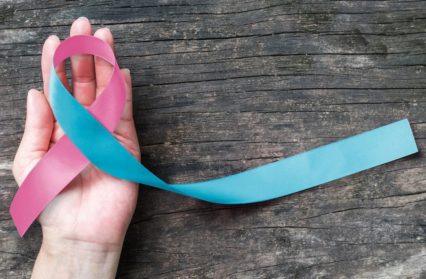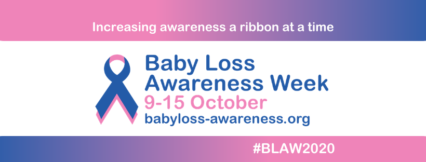As Baby Loss Awareness Week draws to a close, Esyllt Sears considers the representation of miscarriage in popular culture and reveals how important its portrayal can be in helping those affected recover from their trauma.
It only recently occurred to me that, on-screen, miscarriage is mainly used as a catalyst for a storyline, such as a relationship breakdown, rather than as a self-contained plot or event in its own right. We rarely get to see the turmoil the mother experiences, only how it affects her relationship with others. I was marking Baby Loss Awareness Week (09 – 15 October) on Twitter when I first considered this and wanted to find out how miscarriage is portrayed in popular culture and whether or not its representation is adequate.
The first time I remember it being dealt with on a high profile TV series was in S6 E12 of Sex and the City, when Charlotte, who has wanted nothing more than to be a mother, miscarries. There are touching moments, like when Miranda says “she has to feel it”, and a scene with Carrie which seems to really hone in on the sadness of losing a baby. But this episode does get things wrong: Charlotte’s husband announces the loss simply by saying “it went away”, like a scab that suddenly falls off your knee. The idea that you would find enough courage to attend a child’s birthday party on the same day that you’ve lost your baby, just because you’ve watched a documentary about Elizabeth Taylor, is grating.
You cannot just dedicate one episode to this subject, especially if it’s happening to one of the main characters. Miscarriage, for so many women, is a long drawn out process – from spotting blood for weeks leading up to a scan, to the scan appointment itself which often requires a follow-up if you’re in the early stages of pregnancy, to the days surrounding the loss, the weeks following when you’re still bleeding, to the months of grieving, to it rearing its head forever more. I appreciate that every woman’s experience is different, but this was certainly my journey and I’m sure thousands of others have experienced the same.
This Sex and the City episode aired nearly twenty years ago so I will gladly leave it within its historical context; the fact that it was dealt with at all in 2003 is something. So, surely things must have changed by now? There is currently a miscarriage storyline in the soap Neighbours (yes, I am a not-so-secret Neighbours fan), but it is yet again used to facilitate the breakdown of a couple’s relationship. I’m disappointed.
I recently came across an article in the Guardian, written by Isabelle Oderberg, where she discusses a miscarriage storyline in The Bold Type, an American comedy drama series. The article subheading reads: “Stories of miscarriage are so rare in popular culture, it’s even more disappointing when they’re mishandled”. This tells me everything I need to know about how the subject is presented, to this day.
The glimmer of hope for me came courtesy of Fleabag when the central character’s sister reveals that she is experiencing a miscarriage. It is only a short scene (and as her sister is a supporting character I don’t expect it to take centre stage), but the immortal line: “Get your hands off my miscarriage. It’s mine. It’s mine” was a defining moment. It so truthfully portrays the raw feeling of trying to protect something and manage a situation that is completely out of your control… and features in a comedy.
But is comedy the right place for it? Can you laugh at a miscarriage? Should you? I’ve laughed at inappropriate moments at funerals, I’ve laughed when I’ve been told that someone’s died, and I even managed to laugh as I grieved for my baby. There were bizarre and funny moments during my traumatic experience. For example, I planted a tree in memory of the baby a few months after the event, which eventually died… as did the replacement tree. Woe is me.
What gives me hope is that more individuals in the public eye are discussing this now. Take Chrissy Teigen for example: she went very public with her loss a few weeks ago, sharing photos of herself in hospital on social media. She did come up against some criticism for this, with people claiming that she was being too open. Personally, I found great comfort in it. Here was someone who has a seemingly perfect life and who comes across as very strong in the face of trolls on social media, and she was experiencing the same horrors I did.
Yes, miscarriage is common. And frighteningly so. And it is morbid and heart-breaking and it involves babies. I get it. But so much of being able to grieve and recover from trauma is knowing that others are going through something similar and that it’s in the public eye enough for you to be able to bring it up in conversation without shocking anyone.
I’ve always wanted people to know that I have three children, just that I wasn’t lucky enough to know or even meet one of them. I don’t want to hide the baby I lost like a shameful secret that should never be uttered lest it upset the village elders. So I would love to see more all-consuming, drawn out and heart-breaking TV storylines, but with glimmers of hope and laughter, as happens in real life.
You might also like…
After being devastated by the impact of the coronavirus, will we see the live comedy industry make a comeback in 2021? Welsh writer and comedian Esyllt Sears, recently appointed to represent Wales on the board of the Live Comedy Association, shares her thoughts on where comedy is heading in 2021.
Esyllt Sears is a writer and stand-up comedian from Aberystwyth.












